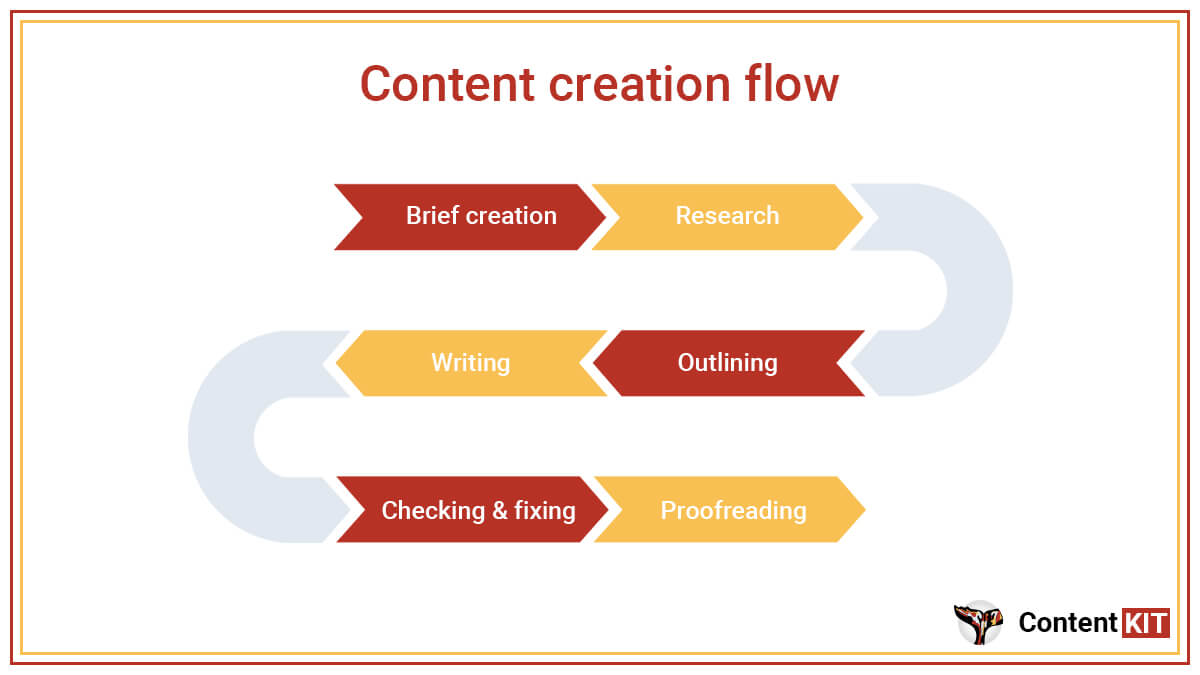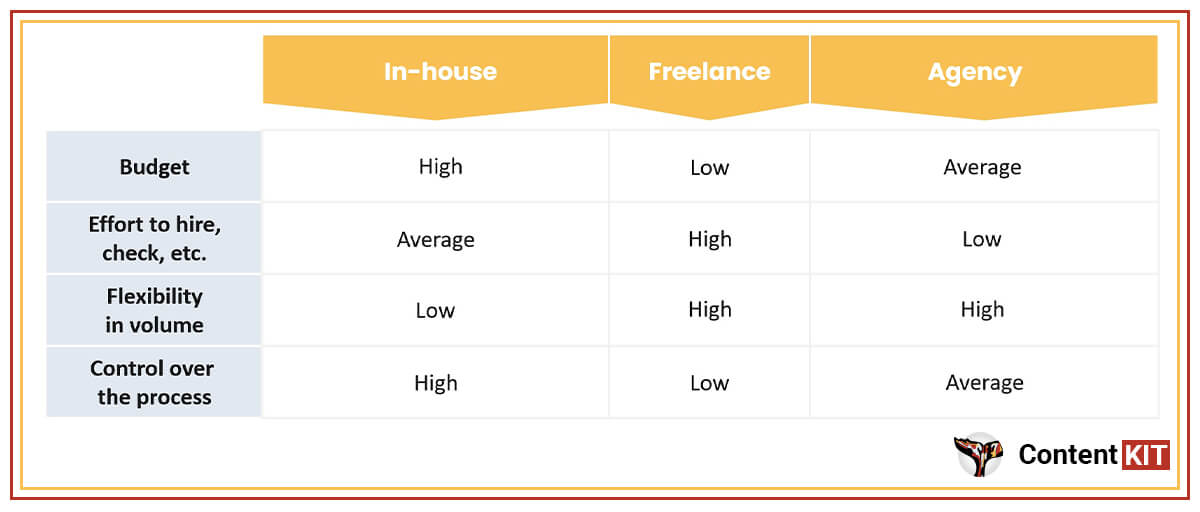
Latest Posts

How Many People Do You Need to Maintain a Business Blog?
Every company starting a new blog or trying to scale and improve an existing one faces these questions: "How many people do we need to keep the blog rolling? And who should these people be?"
Do you need only a writer — or several writers — to create content? Or do you also need an editor to polish their style and grammar? And what about a content manager to plan and uphold the process?
It appears tricky at first sight, so let's sort some things out.
The Task
The very first question is: how many articles do you need on a regular basis?
If you need only one article per week, one good in-house writer may be enough. This person may also build other content for your business, such as emails, website copy, etc. You'll need to teach them about the company's products and processes and possibly final-check the articles before publication, and that's all.
Things become more complicated if you want to scale the blog and beat the SEO competition. In terms of content creation only, this means that "just writing" will not be enough anymore.
You'll need to follow the competition and research the topics deeply. The creation of every article will take much more time and effort than simply jotting down the basic ideas that float to the surface.
Why so?
For most business niches and topics, the competition for top search-result positions is substantial. Together with the latest Google updates, this means very high demand for quality content that requires extensive research, practical structure, and a strong understanding of SEO and the competitive scope.
And this is the moment you either need to outsource the process or start building a content department inside your company.
Your choice does not really depend on the number of articles you want to produce. Instead, it depends on the amount of time you are ready (or not ready) to spend managing the process. You may find yourself overloaded with just two or three articles per month because some topics require you to go really deep.
The Process
It's quite easy to teach one writer to do exactly what you want, but when you have more people, you need to divide the process into smaller steps and maintain high standards on each of them. This will ensure your team understands your expectations, and in turn, your blog will be solid, both in perceived quality and results.
Here's what the process typically includes:
- Creating a brief. Filling out all the information received from a marketer or an SEO specialist. Asking questions if something is missing.
- Research. Gathering info inside and outside the company, searching for relevant studies, conducting competitive research, and building the outline of the future article.
- Outlining. At this stage, which may be performed by either a researcher or a writer, it is important to create a very detailed outline of an article to make sure everything is correct, well-structured, and aligned with the company's style and vision.
- Writing. The writer creates an article based on a ready-made structure and proven information sources. In this way, the chances that the result will correspond to the expectations are quite high.
- Checking and fixing. It's highly recommended to have every article checked by another person because a writer becomes blurred after working on the text. Here, an editor checks facts, style, and other aspects of a piece.
- Proofreading. All the style and grammar mistakes are polished, and the text is readied for publication.

There's a temptation to "optimize" the process for your own ease and budget in ways such as:
- Asking a writer to do research
- Not checking the outline because the writer knows what to do
- Skipping the outlining stage altogether
- Neglecting to proofread
Can you do that? Of course, you can. And it may even work for some time. But very soon, such a decision will lead to a huge waste of time on your side if you are responsible for the result.
Why so?
It's a matter of quality. If these steps aren’t conducted by professionals who have both the skills and the propensity for this specific type of work, your blog will ultimately reflect poorly on your business.
Here are the main roles of a professional content team:
- A content marketer is a strategist. They plan monthly activities for your blog, align them with your goals and plans, and control the process.
- A researcher is a digger. They dive into a topic, find information that does not lie on the surface, and form a unique angle.
- A writer is a creator. They know how to build an interesting story, convince, and hook a reader.
- An editor is a perfectionist. They sniff out the logical and stylistic mistakes and see what writers often don't see.
Put this all together, and you’re likely to end up with a solid, high-quality blog. Remove one link from the chain, and you'll weaken the whole process. The information may be too superficial, or the logic may break, blurring readers' attention.
You will lose readers, and in turn, you will lose customers.
The Options
So, how do you build the process if you need content creation regularly and want to free up your hands on one side and ensure quality on the other?
There are three main options for a content creation process setup: build a content department in-house, find freelance writers, or hire an agency.
Let's take a closer look at all of them.
In-house content team
Here's the minimal content team you'll need to maintain your business blog:
- A manager. They will plan, research, and check articles.
- Writers. They will do the actual content creation and possibly a part of the research.
- An editor. Even the best writers sometimes accidentally overlook inconsistencies and grammatical mistakes. An editor or proofreader is always a must for top-tier content — or you should be ready to play this role yourself.
This one is a good option if the content is an essential part of your business (e.g., a news portal, marketing agency, etc.) and you absolutely need your content team to be present at your office meetings and have all the latest changes at their fingertips. The same works if your business lies in a super complicated technical niche where each writer needs to be taught individually.
On the other hand, in-house teams are not cheap with all the full-time salaries, office costs, and benefits packages.
And also, scalability may become an issue. To increase the volume, hiring and training each new team member may take quite a lot of time and effort. At the same time, decreasing the amount of content produced (if necessary) will become an even bigger problem, as you may need to eliminate some team members.
Freelancers
It's an obvious option that comes to your mind as an easier alternative to forming an in-house team, as it seems that:
- Freelancers are cheaper (at least, you don't need to pay them full-time).
- You may quickly hire more people if you need more content.
- Decreasing the writing tempo is not an issue: you may just stop ordering articles from them.
But it's not so easy when it comes to practice.
First of all, it may take way more time to find really good freelance writers to correspond to your expectations than it seems from first sight.
The quality is also a question. Even if you find nice candidates, and they complete a test task to your expected standard, that doesn't mean they will maintain their enthusiasm for a long time. Decreased quality is a common situation when freelancers work in a hurry, which reflects on their style, an article's depth, and deadlines.
So, you need to be ready to check and control everything manually.
And sometimes, they just disappear. You might wait patiently for the text and write them multiple messages, only to finally receive a reply two weeks later: "I'm sorry, sir, we had holidays in my country," leaving you confused and wondering where on the Earth holidays mean national internet disconnection without a possibility to warn you about that in advance.
So, I'd say it's a good option only if you need content from time to time and are not very dependent on deadlines.
Agency
If you apply to an agency, they will already have all those people (writers, editors, researchers, etc.) tried, tested, and ready to work. The best part is that you won't need to hire each of them individually, saving your time and effort.
What is also important, you won't need to pay all these people full-time — you may pay hourly or based on the articles' volume and get what you want in terms of both schedule and quality. And you won't need to manage the process at every stage; just set tasks and receive the results.
It is an optimal choice if your product is not too complicated and your writers don't need to be in touch with your developers and marketers every single day. Also, you might outsource some of your content (e.g., guest posts or easier content) to improve both the speed and the cost of content creation compared to in-house only.
So, hiring an agency is:
- Usually cheaper than an in-house team, but good writers cost money. So, it will definitely be more expensive than most freelancers on Upwork.
- Easier in terms of management. Quality control should be built into an agency's processes, so you'll need only to check and approve the final stages, where required.
- Easier for onboarding. Again, you'll need to teach one person (your project manager) about your requirements, and the remaining training will be done inside the agency, working to your benefit for years.
Different agencies work in different ways, and there is more than one correct approach, but here's how the process looks within Content KIT:
- With a new project, we arrange a call to discuss the content creation goals of your company, your main requirements, and expectations.
- We write a no-commitment test article for you with all the stages included:
- You send us a task (brief).
- We create a detailed outline and approve it with you to make sure the article will correspond to what you need.
- We write the text, including several stages of quality assurance.
- You check the final version and add your comments, if necessary.
- We alter and improve the article to meet your standards.
- And our professional proofreader conducts the final polish to make sure everything is perfect.
- If you’re pleased with our work, you pay for the first text, then we sign a contract and plan our further cooperation.
- You get your private project manager who will know your project, collect all of your comments, requirements, and updates, and track all the tasks and their execution.
- And a mini-team of researchers, writers, and editors is formed for your project. Whether it's dedicated or not depends on the amount of articles required every month, but the same people will be working on your task every time, with a deep understanding of the subject.
This process is not the shortest one and takes from 5 to 12 days to execute a deep, well-researched article. But based on my 12+ years of experience with different content teams and projects, it's best to focus on quality.
If you want to see the results (some of our texts and their performance), please feel free to check them out on our website.
The Conclusion
The amount of people you need is not proportional to the amount of articles you need. It's not like "one writer for every X articles per month." The more articles you need, the more complicated the process will become. You will need more writers and also professionals to support the process: to plan, research, check, and refine the pieces.
If your business is directly connected with content creation, you may want to have an in-house team consisting of a manager, editor, writers, and possibly researchers.
If not, addressing an agency may help you save time and money and maintain your required quality and standards to grow your business.
Or, if you need content only from time to time, one or two well-tested freelancers may also be a good solution.


